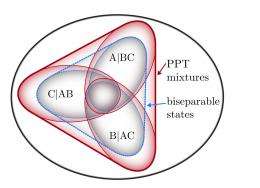May 20, 2011 feature
Simplifying the process of detecting genuine multiparticle entanglement

(��������Org.com) -- The ability to entangle particles is considered essential for a number of experiments and applications. While we have seen evidence for quantum entanglement, it is still difficult to detect unambiguously. Multiparticle quantum correlations are especially important for work with optical lattices, superconducting qubits and quantum information processing. "Entanglement in large qubit systems is becoming more important," Bastian Jungnitsch tells ��������Org.com. "Unfortunately, the characterization of multiparticle entanglement is difficult."
Jungnitsch, a Ph.D. student at the Institute for Quantum Optics and Quantum Information at the Austrian Academy of Sciences in Innsbruck, Austria, has been working on a way to simplify the way that multiparticle entanglement is characterized. Along with Tobias Moroder and Otfried Gühne from the University of Siegen in Germany, Jungnitsch created criteria that can be easily implemented in experiments. Their work is published in ��������ical Review Letters: “Taming Multiparticle Entanglement.”
To thank our 25,000 fans in the Facebook community, this story was posted on the a few hours before going live on the main site
“We developed a criterion that can easily be implemented so that others can use it,” Jungnitsch says. “Experimentalists can download it from the Internet and use it to measure entanglement. It provides results that others can understand, helping to let them know that these particles are really entangled.”
The team from Austria and Germany used what they call “suitable relaxations” to develop their criteria. The method involves first considering a quantum state involving three particles. If the state can be separated out using different partitions, it is called biseparable. When in a biseparable state, the system is not considered to be entangled. If, however, the quantum state is not biseparable, it can be thought of as genuinely multiparticle-entangled, meaning that all particles are entangled and not only some of them.
“There are many states that are entangled in some sense,” Jungnitsch points out, “but it’s not easy to see if they are genuinely entangled. We relaxed the definition a bit, and it still works pretty well. Our method won’t work for all entangled states, but you can still catch the phenomena of entanglement pretty well.”
“The point is to make sure that your particles are in a genuinely entangled state,” Jungnitsch continues. “In many cases, you want to know if all of the items prepared are entangled.” Otherwise, for some operations, you might not get the desired results. “When particles are genuinely entangled, they can be useful for a number of operations. Our criteria can help experimentalists verify that the state really is entangled. It’s something useful and practical.”
Jungnitsch says that they have already provided the code for download. “It can be used in experiments now,” he says. “We wrote the code and put it on the Internet. Experimentalists can download and then run the code on their own computers as part of their efforts to see whether or not their multiparticle systems are entangled.”
Some refining is still possible, however. “We have been working on applying the code to specific states – important states.” Because there are some applications that require certain quantum states, being able to detect whether or not particles have reached those states is important. With some adjustments to the code, it should be possible to characterize such entangled states even more accurately.
“Of course, the long view is always quantum computers,” Jungnitsch acknowledges. “But there are other applications for quantum correlations as well. The first step to many of these applications, and to improving quantum information processing, is to verify entangled states. Our efforts can help with that.”
More information: Bastian Jungnitsch, Tobias Moroder, Otfried Gühne, “Taming Multiparticle Entanglement,” ��������ical Review Letters (2011). Available online:
Copyright 2011 ��������Org.com.
All rights reserved. This material may not be published, broadcast, rewritten or redistributed in whole or part without the express written permission of ��������Org.com.
















